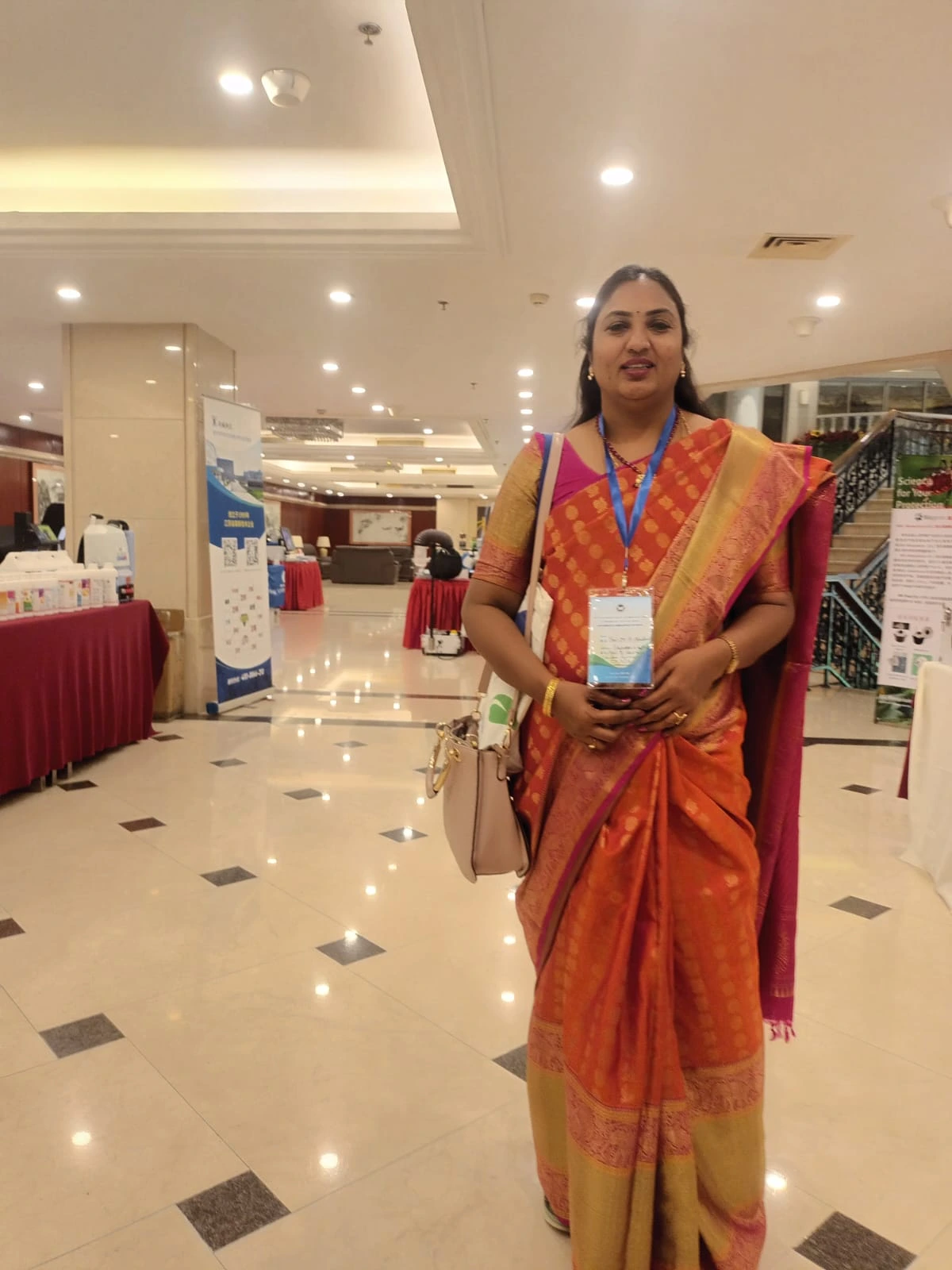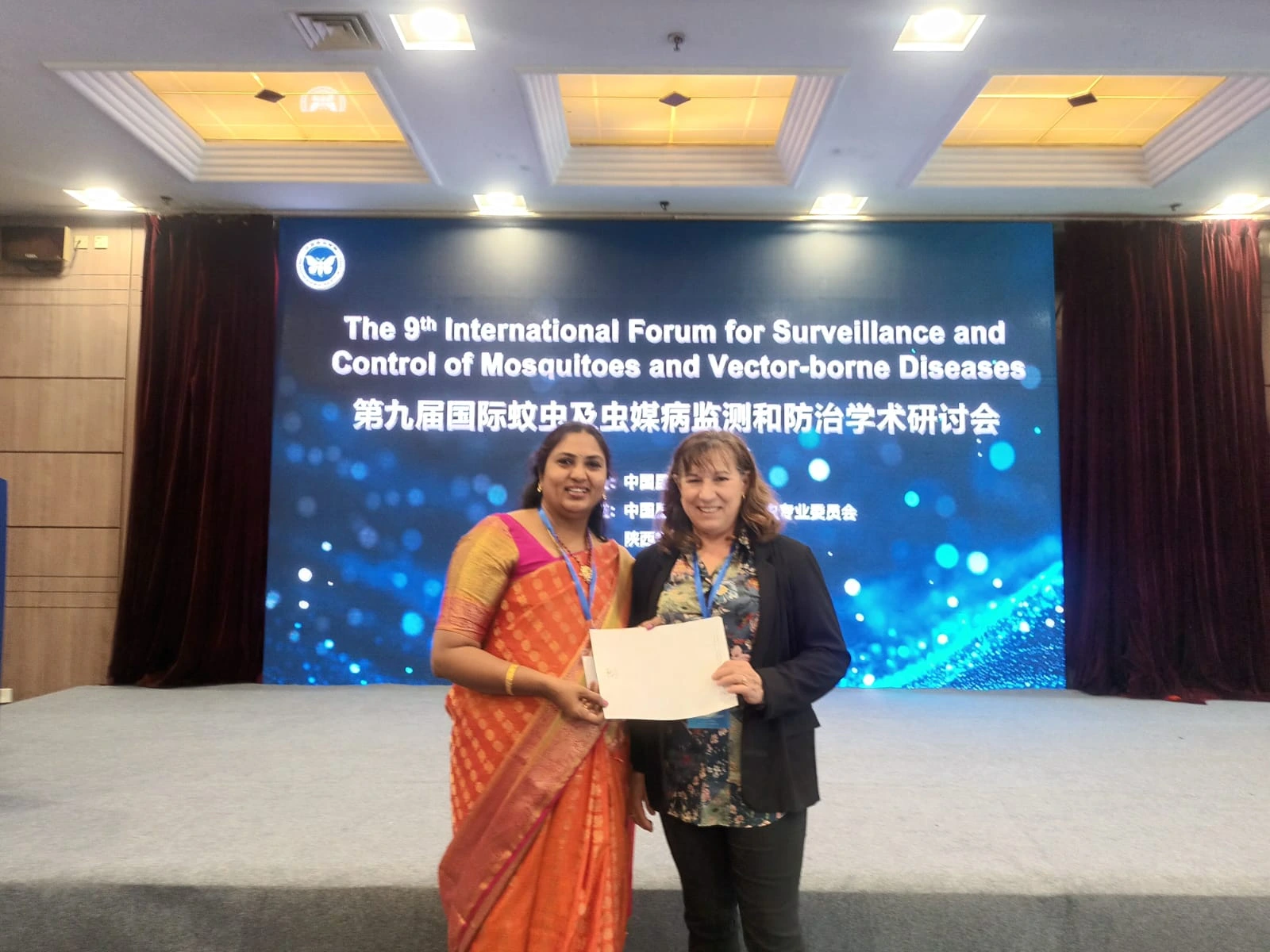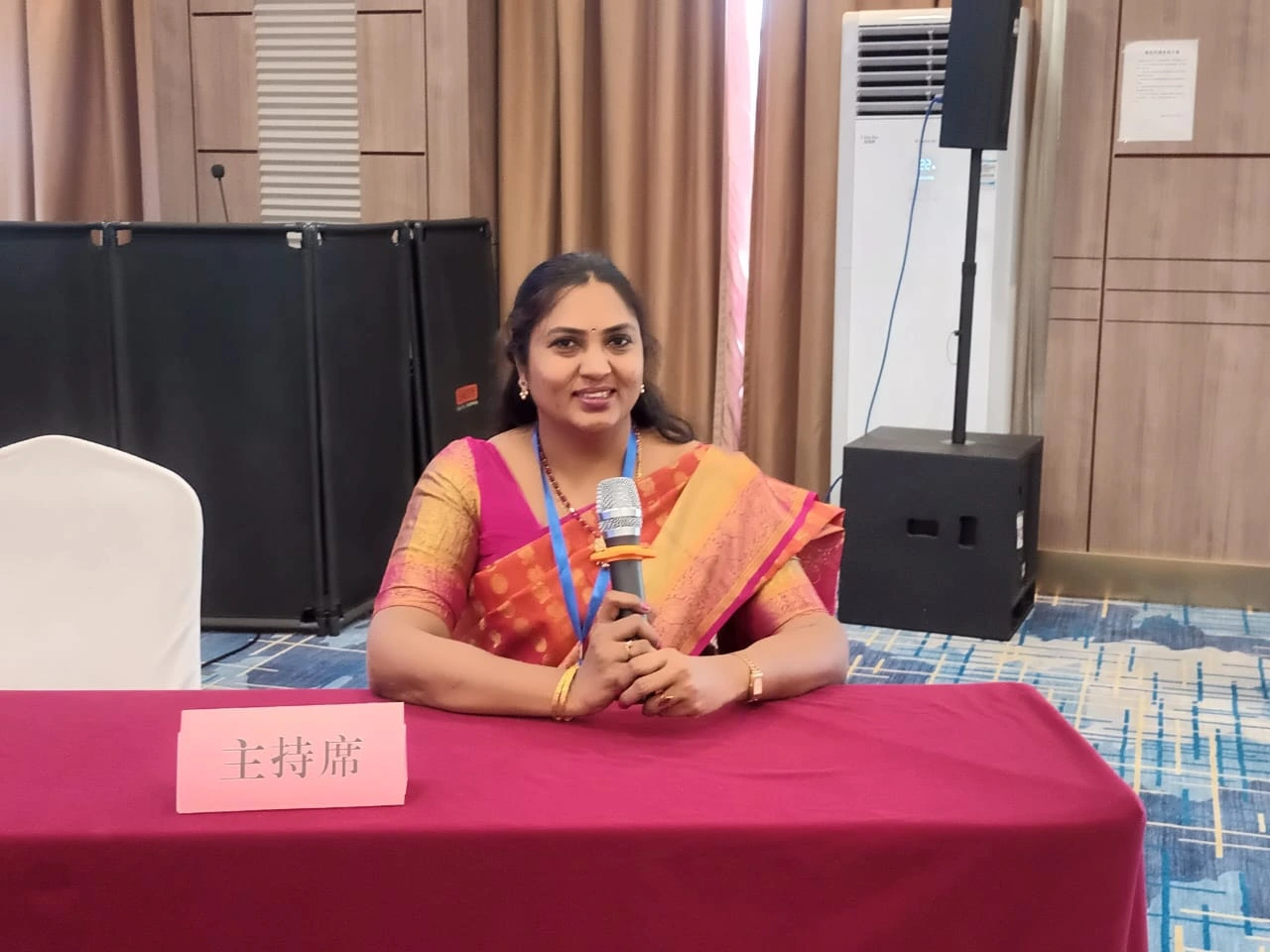(June 23, 2025) Not many scientists can say their work has taken them from quiet university labs in Hyderabad to global stages across Asia and beyond — but Prof M Madhavi can. Her pathbreaking research on fighting mosquito-borne diseases using Indian medicinal plants and zinc oxide nanoparticles has not only saved lives but also earned her global respect. Whether it was a standing ovation in China, a top award in Singapore, or recognition in Sri Lanka and Malaysia — her work has travelled far. She’s making waves in international science circles and putting India’s ancient plant wisdom on the global map.
“It’s not about scientific milestones alone. I like to work towards real world solutions that touch lives,” smiles Prof M Madhavi, the former head of Osmania University’s department of zoology, in a chat with Global Indian.

A sustainable approach to vector-borne disease control
Two decades ago, when Prof M Madhavi set out on a mission to combat the killer mosquitoes which spread dreadful diseases like dengue and chikungunya — one of the first things she did was to build an arsenal of Indian medicinal plants that could wipe them out. It comprised a variety of plants, particularly Catharanthus roseus and Calotropis procera leaf powder extracts — the two most potent ones among the rest.
What followed was years of painstaking research, and analysis. The mission was finally accomplished after the determined professor developed zinc oxide nanoparticles that proved effective in killing the killer mosquitoes.
Vector-borne diseases like dengue, malaria, and chikungunya are a major health concern in countries such as India, Brazil, Thailand, Indonesia, Nigeria, and Sri Lanka. Spread by mosquitoes, these illnesses cause over 700,000 deaths worldwide each year, according to the WHO. In India alone, dengue cases crossed 236,000 in 2023, with states like Kerala, Tamil Nadu, and Delhi among the worst affected. With rising temperatures and rapid urban growth, the problem is only getting worse. That’s why Prof Madhavi’s eco-friendly mosquito control research doesn’t just help India — it has the potential to benefit countries around the world.
India’s eco-researcher takes centre stage in China
Presently serving as the Chairperson, Board of Studies (BoS) for two Universities — Satavahana University, Karimnagar and Telangana University, Nizamabad — Prof Madhavi was recently invited to Xiang, China to deliver a talk on vector control at the International Forum for Surveillance and Control of Mosquitoes and Vector- borne Diseases (IFSCMVD).

More than 450 researchers from all over the world including US, China, Switzerland, Thailand and France listened to Prof Madhavi’s talk with rapt attention at the event, organised by the Entomological Society of China (ESC). “As my research was completely based on the indigenous plants and ZnONPs (Zinc Oxide nano particles), it stood out among the works of the rest of the researchers,” says Prof Madhavi, thrilled after receiving two certificates of honour at the May event.
The Entomological Society of China (ESC) acknowledged Prof. Madhavi’s dedication and scientific contributions by inviting her to moderate the session on ‘Vector Control and Insecticide Resistance’ — a moment she describes as both humbling and motivating. “All my colleagues in OU were extremely happy and they encouraged me to keep going,” she says, reflecting on the support back home.
Her research spans many areas, including Entomology, Sericulture, Biodiversity, Bioinformatics, and Toxicology. And with growing global interest in her work, Prof. Madhavi continues to explore new ways to tackle vector-borne diseases.
A research journey from molecules to mosquito control
Prof Madhavi started her research work out of a strong desire to combat the vector-borne diseases, a major public health concern. “As the vectors are responsible for the transmission of the diseases, I tried to do something novel with the synthesis of nano particles from zinc oxide,” says Prof Madhavi, who was earlier bestowed with ‘Best Teacher Award’ by the Indian Red Cross Society.
Her research led her into studying a variety of Indian medicinal plants like Calotropis procera, Catharanthus roseus, vitex negundo, zingiber officinale, rhizome among others.
“Inside the insect body, the nanoparticles inhibits the antioxidants and it malfunctions the organelles and binds to proteins. It alters membrane permeability, inhibits transcriptions and translation and thus blocks the respiratory chain,” explains Prof Madhavi, who also served as the Chairperson BoS, Palamuru University, Mahabubnagar from 2021 to 2025.
Her research work was tested in the laboratory and put to use in the nearby ponds and in other water logged areas with heavy mosquito presence. “It worked effectively,” says the passionate researcher, who has authored 91 international and national publications (peer reviewed journals), 19 books and possess three Indian patents, which stands as a testament of her dedication to high impact research from lab to land.

Global honours for a decade of impactful research
This was not the first time she received an international recognition for her outstanding contribution in the control of vector borne diseases.
In December 2019, Prof Madhavi received the Best Oral Presentation Award at the 22nd International conference on Medicinal Chemistry, Drug Discovery at Singapore. Earlier, she was also honoured with the ‘Best Research award’ for her work in vector borne diseases in Sri Lanka. Over the last decade, her work was recognised at various state, national and international forums including at events held in Malaysia and Nepal.
An early topper with a lifelong love for science
Born in August 1977 in Hyderabad, Prof Madhavi completed her Class 10 at Abhyudaya High School, Chikkadapally. She went on to study at Stanley Junior College, Abids, and pursued a B.Sc in Life Sciences with Zoology as her core subject at the University College for Women (OUCW), Hyderabad from 1994 to 1997.
Topping her class became a habit early on—starting with Hindi and Science during her school years. “During my intermediate, I topped in Sanskrit, Botany and Zoology. During my undergraduate studies, I received a rank certificate for securing an overall rank of six. Besides, I was Entomology topper (Gold Medalist),” informs the passionate researcher who did her M.Sc Zoology with Entomology as specialization from Osmania University, Hyderabad from 1997-1999.
Prof Madhavi also received a Merit Scholarship during her Post Graduation and earned her Doctorate from Osmania University in 2012. “I was passionate about teaching and research right from my early years, though my aim was to become an IAS officer to serve the people.”
Building future scientists through mentorship
With a teaching experience spanning 23 years and 21 years of research experience, Prof Madhavi, who has been working as a professor since 2020, mentored more than 100 PG students. “I instilled in them the confidence to pursue active and live internships to continue their efforts to pursue their doctoral studies,” informs Prof Madhavi, who completed her tenure as Head, Department of Zoology recently.

During her tenure, 21 symposiums and workshops were successfully organised, including a 7-day online international webinar. She also delivered guest lectures at several prestigious institutes and Academic Staff Colleges, not just in Telangana and Andhra Pradesh, but across the country.
A vision for future leadership
A Life Member of Indian Science Congress, Entomological Society of India, Butterfly Conservation Society among others, Prof Madhavi was instrumental in framing the skill enhancement courses by introducing practical skills into the students’ syllabus. In 2022, she received the Vice Chancellor’s Award and was honoured with a memento by then Telangana Governor Dr. Tamilisai Soundararajan at the Women’s Scientist Conclave.
“Currently, I am focussed on my research work as I was recently awarded with a PAIR (partnerships for accelerated innovation and research) project from the Department of Science & Technology, Government of India,” informs the professor, who has awarded 11 Ph.Ds and five are presently working under her.
She currently leads five major and minor research projects funded by the Department of Science and Technology, Department of Biotechnology, and the University Grants Commission—keeping her actively engaged in her field. “I want to continue my research to control vector-borne diseases,” says Prof Madhavi, who hopes to become the first woman Vice Chancellor in Telangana.
Beyond research: a life of purpose and quiet resolve
So what does the professor like to do when not researching? “I listen to music and following current affairs is a must,” says the mother of two who received the ‘SHE Inspires’ award 2020 and Sports Physiologist award the same year.
For Prof. Madhavi, the journey is far from over. With over two decades of research behind her and global recognition growing each year, she remains focused on one clear goal: finding real-world solutions that protect lives. Her work proves that science rooted in traditional Indian knowledge can offer answers to modern global challenges.
- Follow Prof M Madhavi on LinkedIn
ALSO READ | Gagandeep Kang: India’s Vaccine Godmother on a mission to heal and serve



